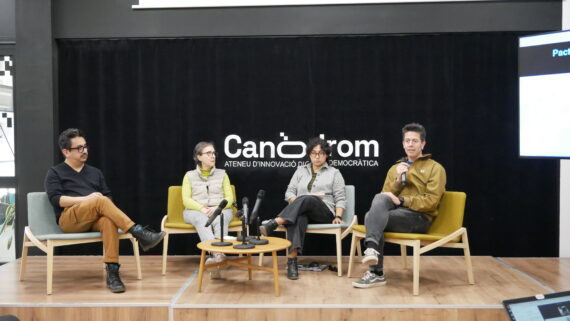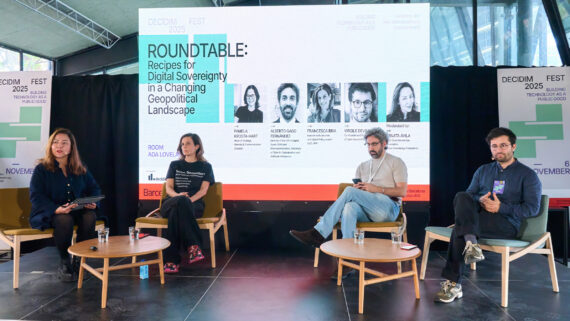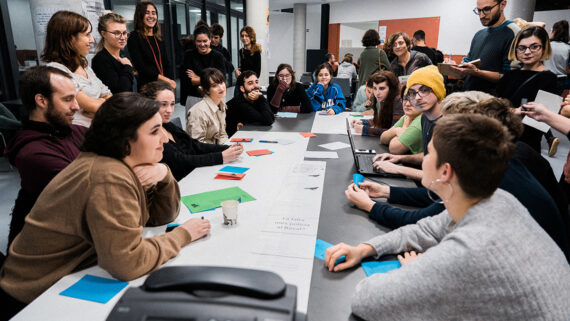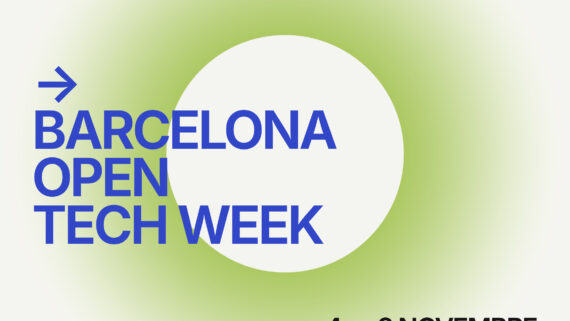
On the occasion of Decidim Fest, we talk with co-founder of Radical Data Rayén Jara, a collective that, through liberation and joy, reclaims the narratives surrounding technology to enhance the defense of human rights.
Of Chilean origin, Rayén Jara is co-founder of Radical Data, a collective project based in Amsterdam which works at the intersection of art, data, and activism. Together with Jo Jara Kroese, they have established collaborative connections worldwide and move between Berlin, London, Barcelona, and Latin America. In a digitized world where we are increasingly disconnected from the body, they work from bodily knowledge, dance, and performance. From their experience, they urge us to reclaim this relationship, learn from the Global South, and assert joy as a tool for social transformation. We spoke with them within the framework of the Decidim Fest 2023, the festival of technology and democracy held at Canòdrom.
What topics does Radical Data work on? What do you want to raise awareness about?
Is your subversive defense of joy, pleasure, and enjoyment a reaction to the culture of hate that the Internet is increasingly adopting?
How have you put into practice the idea of resisting through your work with data?
How do we challenge dominant narratives in technology?
There is a lack of information about our bodies, especially concerning female bodies. For instance, 70% of individuals with chronic migraines are women. Faced with this lack of knowledge in the medical field and the massive misinformation present on social media, we aim to be an empowering tool in these contexts.
At Self, we attempt to overturn the discourse of body capitalization, hyper-optimization, and individualistic hyper-productivity prevalent in current body data monitoring applications. This perspective excludes many bodies. We have flipped this view to treat them as a systemic entity to be addressed in the community. When it comes to data, ensuring security, encryption, and local storage are also crucial.
When I entered the tech world, what attracted me the most was its power to connect and organize us. It’s essential to scrutinize how we receive narratives about technology, both in the media and on social networks. The dystopian outlook, the idea of impending doom, is profoundly disheartening and doesn’t allow us to act and take agency. That’s why I believe that activism through data is a powerful tool for social transformation.
If looking to the Global South improves our activist perspective in the present, where do we look to build the future of data, art, and activism?
Even though digital passports and surveillance cameras didn’t exist years ago, there was still a surveillance policy. For me, building the future is about appropriating the past and the present we have inherited: colonialist, North-centric, capitalist, ableist, and fossil-dependent.
To avoid losing the future entirely, I like to look at utopian narratives. If we view the digital revolution from a dystopian perspective, we are annihilated. We need to reclaim political imagination. Things that we once thought were impossible are possible. We must learn from science fiction writers of the 1960s, like Ursula K. Le Guin, and use imagination and the tools we have to prevent the loss of our future.
Normative technology operates from separation and individuation. A collective community technology, like what is done here [at Canòdrom], is also crucial for reclaiming that future.







